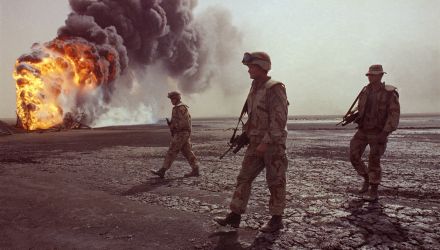This is getting serious now, as the United States and Russia negotiate in Geneva on disposing of Syria’s chemical weapons, and generally responsible media reports say that U.S. President Barack Obama has exchanged letters with Iranian President Hassan Rouhani. This means that three of the four key external actors that are fighting each other through proxy parties in Syria -- Saudi Arabia is the fourth -- are also negotiating or talking directly. This is a welcomed development that should be expanded to include other key actors who engage in Syria, such as Turkey, France, China and Saudi Arabia, so that new regional orders and security architectures can slowly be established to replace the chaotic situation of recent years in the Middle East.
The cruel irony is that Syrians seem to have the least input into events, and the Syrian people are the last ones who have a say in what is now being negotiated in Geneva. These two reasons -- loss of state sovereignty to foreign powers and absence of citizen rights at home -- are why so many Arab countries have experienced uprisings or revolutions during the past 30 months.
The negotiations in Geneva between U.S. Secretary of State John Kerry and Russian Foreign Minister Sergey Lavrov will impact on three separate but overlapping issues: chemical weapons and other aspects of President Bashar Assad’s regime powers, the regional face-off between the Iran-Syria-Hezbollah axis and Saudi Arabian-led forces who oppose it, and the global balance of power between the United States and Russia.
One of the most fascinating aspects of this picture is about Russian-Iranian relations, which include issues like Iran’s purchase of sophisticated arms and nuclear technology from Russia, but that is in its early stages. It seems quite bizarre that a country like Russia that is fighting its own Islamist insurgents in areas like Chechnya should also be discussing serious bilateral deals that will cement relations with the Iranian government, which is the world’s leading exporter of Islamic revolutionary zealotry. Yet this is how global and regional power politics works.
In these Geneva negotiations on Syria the world now will try to restore the functional authority of the UN Security Council as an instrument of international peace and security. Syria’s condition and its chemical weapons are the particular technical issues that have brought the Americans and Russians face-to-face in Geneva to thrash out a solution; but the bigger issue being negotiated is how the United States and Russia will work together in the UN Security Council to manage this crisis and others that may emerge around the world.
Moscow and Washington are the leading players in this situation, but many others comprise a robust supporting cast that is fascinating for including so many non-state actors, like Hizbullah, Hamas, tribal movements, Salafists, revolutionary youth, labor unions, and others beyond the control of governments. The big story of the past nearly a quarter century in the Middle East, since the collapse of the Soviet empire, has comprised two overarching tales: the slow fraying and even some fragmentation and collapse of state authority in a dozen countries where governments proved incompetent or even illegitimate, alongside the constant projection of military power by the United States anywhere it deemed appropriate. The United States has used both its army on the ground in Iraq and Afghanistan as well as its technologically advanced air power and drones to attack enemy targets from a distance. The Middle East and South Asia have been the heart of America’s policy of asserting its moral and military authority to fight foes that it feels threaten it or its allies, such as Al-Qaeda or Iran.
Pushing back against this post-Cold War American tendency to project its power globally has been a group of countries and movements that rarely worked together, such as Russia, China, Iran and others. The core of resistance to U.S. power has been Asia, whether Arabs and Iranians in west Asia, assorted movements in South Asia, China in East Asia, or the Russians in north-central Asia. Most of these forces now line up with the Syrian government in its two battles against its foes at home and against American-led foreign action to remove the Assad family from power. The famous American pivot to Asia that we have heard about for some years focuses for the moment on the fulcrum of Syria, around which many Asian actors congregate to check and push back the alliance of countries and movements led by the United States.
If the Geneva talks succeed, they will likely see a revival of the UN Security Council as an instrument of global peace-keeping based on existing international law and conventions; that would happen because Russia and the United States would have restored a working relationship on how to manage their proxy wars around the world. Rarely do we get to witness such historic developments as they occur before us in real time. We might look back on this week one day as the start of the post-Cold War global order.
Rami G. Khouri is Editor-at-large of The Daily Star, and Director of the Issam Fares Institute for Public Policy and International Affairs at the American University of Beirut, in Beirut, Lebanon. You can follow him @ramikhouri.
Khouri, Rami. “New Order Being Born in Geneva.” Agence Global, September 14, 2013





